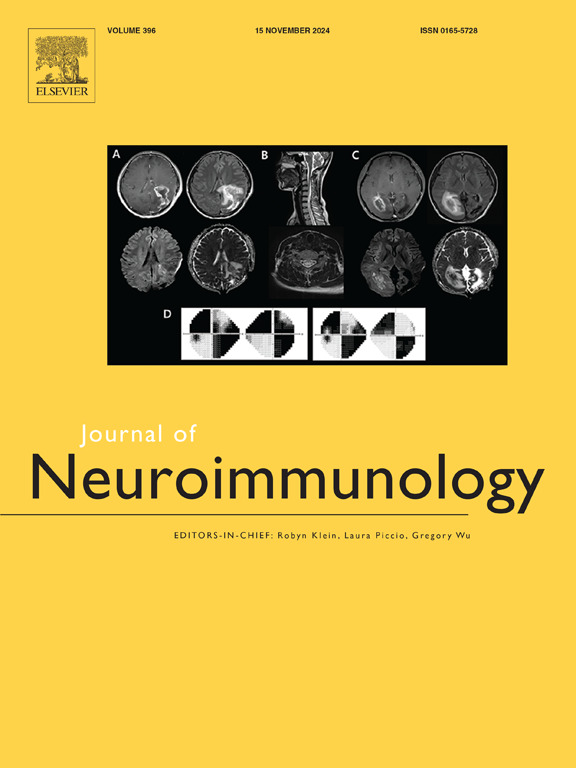Bergapten inhibiting NLRP3 inflammasome activation and pyroptosis to alleviate neuropathic pain in a rat mode of chronic constriction injury
IF 2.5
4区 医学
Q3 IMMUNOLOGY
引用次数: 0
Abstract
Neuropathic pain is a persistent and treatment-resistant condition often linked to neuroinflammation and pyroptosis in the spinal cord. The NOD-like receptor pyrin domain-containing protein 3 (NLRP3) inflammasome has emerged as a key contributor to this process. Here we investigate the efficacy of bergapten (5-Methoxypsoralen), a natural compound with anti-inflammatory activity, in managing neuropathic pain. A model of chronic constriction injury (CCI) was established in rats to induce neuropathic pain. Bergapten (100 mg/kg) was intraperitoneally administered once daily for 21 days. Mechanical and thermal pain sensitivity were evaluated at multiple time points. Spinal dorsal horn tissue was analyzed using immunofluorescence, western blot, and RT-qPCR. Bergapten significantly reduced thermal hyperalgesia and mechanical allodynia in CCI rats without affecting baseline nociception in sham controls. Molecular analyses showed decreased pyroptosis, reduced levels of cleaved caspase-1 and GSDMD-N, and suppressed expression of IL-6, IL-1β, and IL-18. Bergapten also downregulated NLRP3 and ASC and restored expression of miR-20b-5p. Bergapten alleviates neuropathic pain by inhibiting pyroptosis and neuroinflammation through suppression of the NLRP3 inflammasome pathway, suggesting its potential efficacy for treating neuropathic pain.
Bergapten抑制NLRP3炎性体激活和焦亡以减轻大鼠慢性收缩损伤模式的神经性疼痛
神经性疼痛是一种持续性和治疗难治性疾病,通常与脊髓的神经炎症和焦亡有关。nod样受体pyrin结构域蛋白3 (NLRP3)炎性体是这一过程的关键贡献者。在这里,我们研究了bergapten(5-甲氧基补骨脂素)的功效,这是一种具有抗炎活性的天然化合物,用于治疗神经性疼痛。建立大鼠慢性缩窄损伤(CCI)模型,诱导神经性疼痛。Bergapten (100 mg/kg)每日腹腔注射1次,连续21天。在多个时间点评估机械和热痛敏感性。采用免疫荧光、western blot和RT-qPCR对脊髓背角组织进行分析。Bergapten显著降低CCI大鼠的热痛觉过敏和机械异常性痛,而不影响假对照组的基线伤害感受。分子分析显示焦亡减少,裂解caspase-1和GSDMD-N水平降低,IL-6、IL-1β和IL-18表达抑制。Bergapten也下调NLRP3和ASC,恢复miR-20b-5p的表达。Bergapten通过抑制NLRP3炎性小体通路抑制焦亡和神经炎症来减轻神经性疼痛,提示其治疗神经性疼痛的潜在疗效。
本文章由计算机程序翻译,如有差异,请以英文原文为准。
求助全文
约1分钟内获得全文
求助全文
来源期刊

Journal of neuroimmunology
医学-免疫学
CiteScore
6.10
自引率
3.00%
发文量
154
审稿时长
37 days
期刊介绍:
The Journal of Neuroimmunology affords a forum for the publication of works applying immunologic methodology to the furtherance of the neurological sciences. Studies on all branches of the neurosciences, particularly fundamental and applied neurobiology, neurology, neuropathology, neurochemistry, neurovirology, neuroendocrinology, neuromuscular research, neuropharmacology and psychology, which involve either immunologic methodology (e.g. immunocytochemistry) or fundamental immunology (e.g. antibody and lymphocyte assays), are considered for publication.
 求助内容:
求助内容: 应助结果提醒方式:
应助结果提醒方式:


